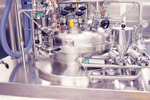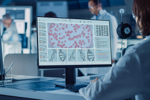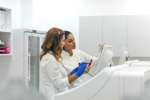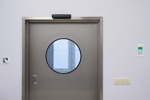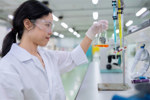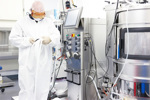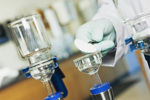-
High Specific Productivity For Leaner Sustainable Bioprocessing
Improving specific productivity moves the goal beyond pumping out higher titers, but it demands a deeper understanding of cellular biology and protein expression.
-
New ISPE Framework Targets Uncertainty In Pharma's AI Deployment
International Society for Pharmaceutical Engineering members developed the guide to offer a risk-based framework for evaluating, implementing, and maintaining AI systems.
-
Oligonucleotide Purification And Synthesis
Examine how a 21‑mer oligo was synthesized and purified through systematic resin screening, method optimization, and successful scale‑up to build reliable, high‑purity chromatography workflows.
-
Purification And QC Of An RNA 21‑Mer Oligonucleotide Via LC‑MS
Learn how buffer choice, gradient strategy, and pretreatment steps influence recovery, purity, and resolution when purifying a native RNA oligo, with analytical confirmation and practical guidance.
-
Scalable, Sustainable Support For Next‑Gen Primer Systems
Explore how an optimized solid‑support design enables higher synthesis scales, steadier pressures, and lower solvent use while preserving yield and purity across diverse oligonucleotide lengths.
-
Facility Considerations When Retrofitting Legacy Sites For ADCs
Antibody-drug conjugate manufacturing requires, among other things, unidirectional flow and air locks for people and materials. Facilities often lack these attributes.
-
The 5-Layer Fix For AI Failure In Pharmaceutical Manufacturing
The promise of AI is colliding with the harsh reality of data chaos in pharma manufacturing. This article explores why most AI investments fail, and a 5-layer solution.
-
Why Use Total Organic Carbon Analysis For Cleaning Validation?
Total organic carbon analysis is probably the most “fit for use” analytical method to validate cleaning processes, particularly within a science- and risk-based approach.
-
Do's And Don'ts Of Material Handling When Retrofitting For ADCs
Antibody-drug conjugate manufacturing includes extremely dangerous ingredients, and most legacy facilities lack the features and flows for safe handling.
-
Building Enterprise Resilience From QRM Signals
Turn enterprise resource management (ERM) from a checklist into a true decision system — so risk informs everyday choices before quality events become supply disruptions, delays, or regulatory exposure.
-
Enhanced Flow Kit Performance With Leak And PUPSIT Testing
Sterile drug filtration demands rigorous integrity testing to prevent contamination. Learn how PUPSIT and in situ leak testing strengthen compliance with EU GMP Annex 1 and ensure reliable manufacturing.
-
Automated PUPSIT For Drug Product Applications
Automated filtration systems streamline PUPSIT, leak testing, and integrity checks to ensure sterile drug product processing. Learn how these methods improve contamination control and compliance.
-
Single-Use Standards Are Maturing, But The Process Remains King
The food industry inspired single-use in biopharma, but the regulatory landscape is far more complex. If you're worried about compliance, this discussion can help.
-
Wetting Recommendations For Successful Filter Integrity Testing
Discover best practices for hydrophobic and hydrophilic filters, troubleshoot failures, and optimize wetting in stainless steel and single-use systems to ensure process reliability and product quality.
-
Optimized Product Recovery Using The Drug Product Filtration System
Explore strategies to maximize drug product recovery during sterile filtration, minimize hold-up volume, and reduce dilution after PUPSIT to ensure higher yield, improved efficiency, and less waste.
ABOUT BIOSIMILAR MANUFACTURING
Biosimilars are considered to be low-cost substitutions for pricy, large-molecule biologics. However, biosimilars must meet the same quality, safety, and efficacy as their reference biologic. Manufacturing biosimilars requires a more complicated procedure than that of manufacturing small molecule generics. Companies manufacturing biosimilars are focused on creating a chemical structure that is as close as possible to that of the reference product. Failure rates and operational costs pose a challenge for those companies involved in manufacturing biosimilars compared to those manufacturing small molecule generics.
Small molecule generics are created using the same active pharmaceutical ingredient (API) and, therefore, are chemically identical to that of the originator medicine. The manufacturing process for small molecules comprises only one-fifth of the total in-process tests required to meet Good Manufacturing Practice compared to that of biologic medicines (50 vs. 250 in-process tests). In fact, the manufacturing process for a large molecule is so complex, it cannot be duplicated by two different manufacturers, as the cells used in biologic medicines are unique to the company manufacturing each biologic.
Manufacturing a biologic consists of genetically modifying a cell, which becomes the basis for a cell line used for the production of the necessary protein for the biologic medicine. The protein is then separated from the cells and purified. Biosimilars are created from small alterations to the manufacturing process which creates a molecule that is not identical but closely resembles the reference product. While the differences in the biosimilar molecule might be slight, these changes in the manufacturing process of a biosimilar can affect the efficacy and safety of a biosimilar compared to the reference biologic. Over the past decade, the manufacturing process for proteins has become more standardized and the required technology has become increasingly accessible, leading to reductions in biosimilars production costs. As a result, a greater number of companies have begun manufacturing biosimilars, while reference brand manufacturers are setting their sights on bolstering pipelines and manufacturing biobetters to maintain market share for their soon-to-be-off-patent reference products.
BIOSIMILAR DEVELOPMENT NEWS
- Celltrion's Stoboclo Listed On CVS Caremark Formulary, One Of The Three Largest PBMs In The U.S.... Successive Listings With Major PBMs Accelerate Early Market Penetration
- Alvotech Announces Positive Top-Line Results From Pivotal Pharmacokinetic Study For Proposed Biosimilar To Entyvio®
- CVS Health Helps Customers Accelerate Biosimilar Adoption Through Formulary Changes - Supporting Affordable Options For Osteoporosis Care
- Saya Biologics And Kashiv BioSciences Partner To Bring A Biosimilar Supportive Oncology Therapy To Mexico And CAC
- AGC Biologics Seattle Site Now Certified To Manufacture Biologics For Largest Pharmaceutical Market In South America

